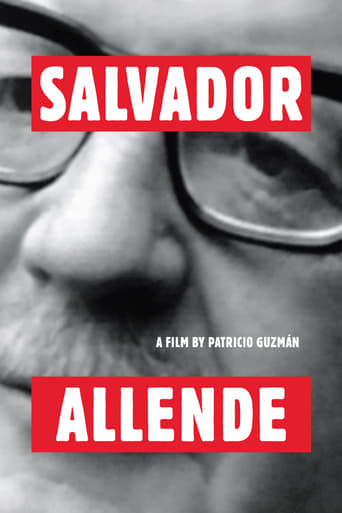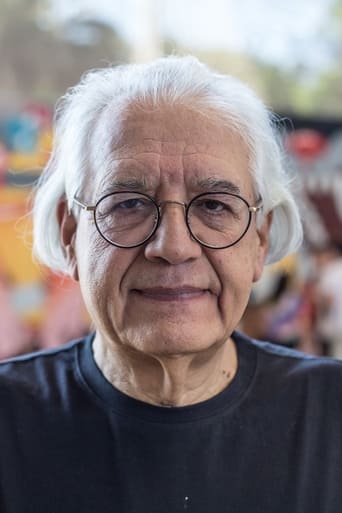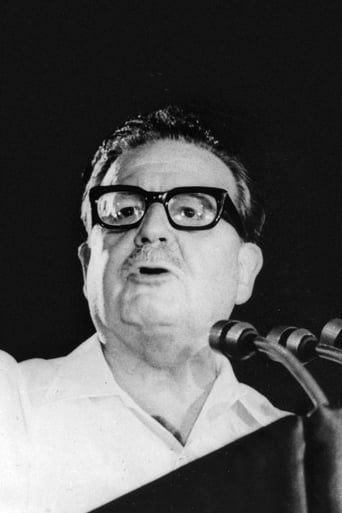A leftist revolutionary or a reformist democrat? A committed Marxist or a constitutionalist politician? An ethical and moral man or, as Richard Nixon called him, a "son of a bitch"? In SALVADOR ALLENDE, acclaimed Chilean filmmaker Patricio Guzmán (The Battle of Chile and Chile, Obstinate Memory) returns to his native country thirty years after the 1973 military coup that overthrew Chile's Popular Unity government to examine the life of its leader, Salvador Allende, both as a politician and a man.


Similar titles
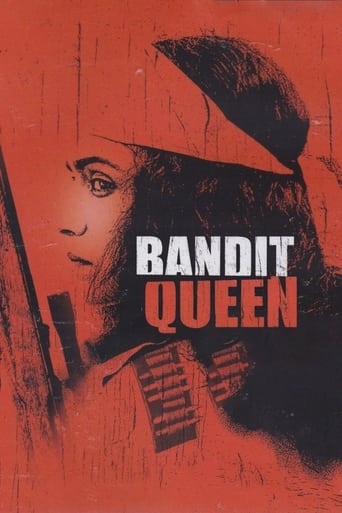
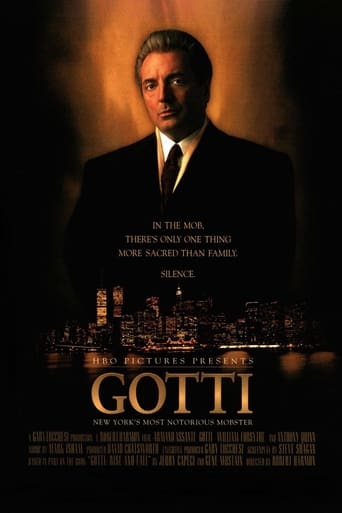
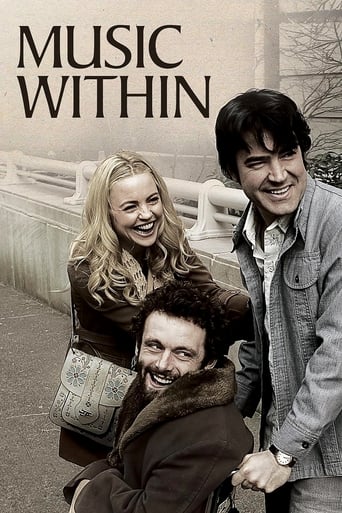
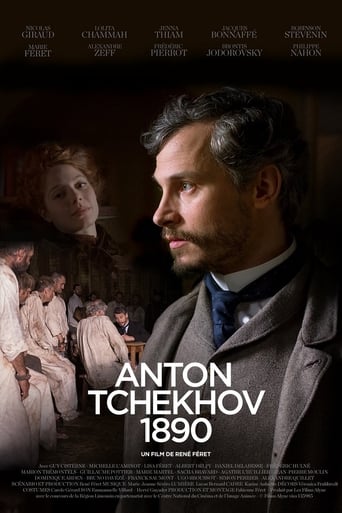
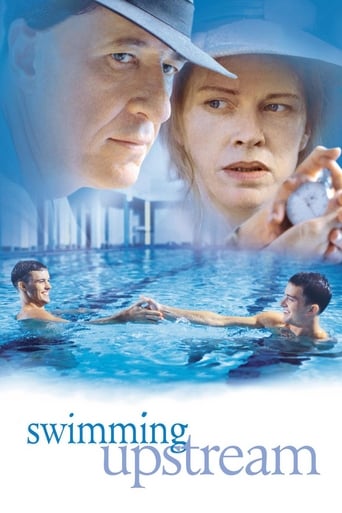
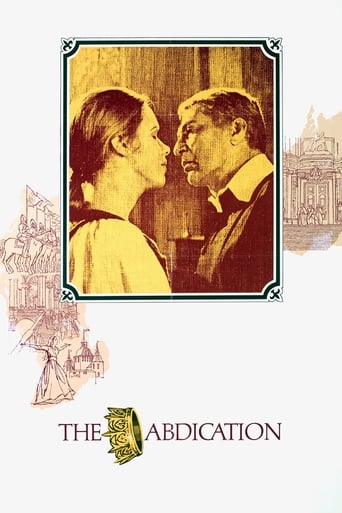
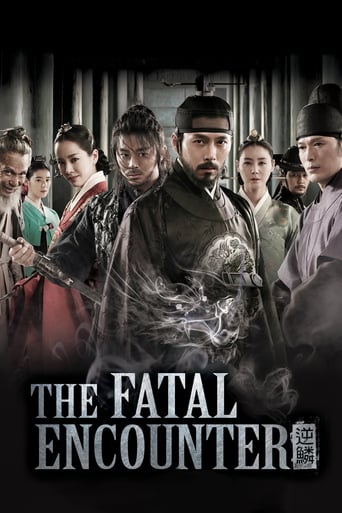
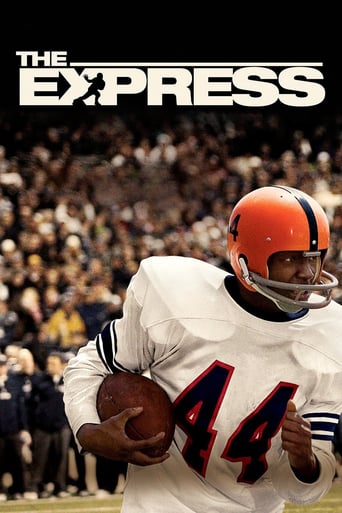
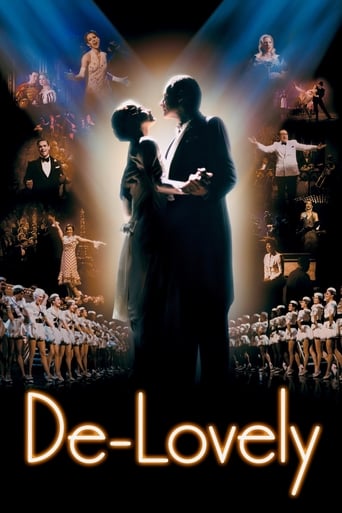
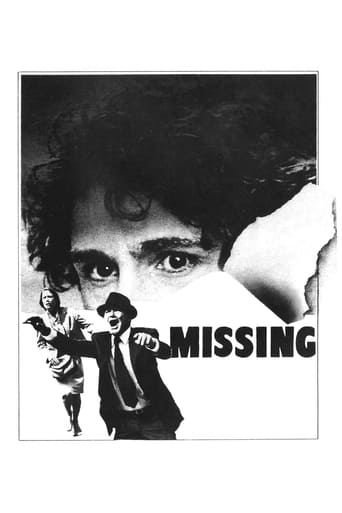
Reviews
Even though documentaries tend to be slightly peculiar and boring most of the time, I found this account of the life of Salvador Allende to be quite intriguing. I loved the varied of opinions that were given from many people from his family members, to a United States government worker. Also, the variety of media used to depict certain events in his life was captivating. I especially loved watching the artist draw his house going up in flames. It made me feel as if I was there on that very day, watching the catastrophe unfold. The charcoal smudged across the page, just as I suspect the smoke veiled the scene that day. This movie has an artistic semblance that I believe goes unnoticed.
This is a tragic, moving tale of a courageous political leader who tried to make the world a better place for the most disadvantaged of his country's citizens. Ironically, it's the interviews with the US ex-ambassador to Chile which seem the most insightful. The ambassador got it exactly right: Allende never had a chance. The forces arrayed against Allende in his attempt to transform Chile into a democratic socialist regime were simply overwhelming: the US, international finance capital, the Chilean bourgeoisie, most of the Chilean middle classes, and the Chilean army. In a sense, Allende should have known better: he had before him the unsuccessful examples of republican Spain in the '30s and Guatemala in the '50s. In neither case had it been possible to introduce far- reaching social and economic reforms which aroused the unconditional hostility of the capitalist ruling class and neighboring reactionary states. And Allende would have had no more success if he had armed the workers and campesinos, since the Chilean army showed no signs of demoralization and disintegration—the conditions under which a "people's army" has a chance to triumph over a well-armed, disciplined professional army. The people in the people's army would have been slaughtered tout court. Perhaps his only chance came with the assassination of Rene Schneider, Allende's pick as head of the Chilean armed forces. He could have used the assassination as an excuse for a thorough house- cleaning of the military high command, assuming he could have found some of Latin-America's famous "left-wing colonels" who would have been necessary to carry out the purge. But it would have been a risky proposition that just as easily could have precipitated the military coup that came 3 years later. The film should also prompt some rethinking of the concept of the "dictatorship of the proletariat"—a concept that's had rather bad press in recent decades. One of Allende's closest friends tells us that Allende was a committed Marxist socialist but certainly not a Leninist, because he did not believe in the dictatorship of the proletariat. Allende, we're told, believed in democracy. But the problem was that the democracy Allende believed in was in reality a dictatorship of another kind: the dictatorship of the bourgeoisie. Despite its façade of multi-party elections, Chilean democracy was a stacked deck, inevitably manipulated in favor of the ruling classes.So Lenin was right: only by forcing the collapse of the coercive apparatus sustaining the rule of the bourgeoisie could the working classes create a state that serves their interests. What distinguishes the dictatorship of the proletariat from the dictatorship of the bourgeoisie is not that one is a multi-party system and the other a single party system (there's no lack of single-party states in the history of the rule of the bourgeoisie). Rather, it's the stacking of the deck in favor of working people versus stacking it in favor of the owners of capital.
Salvador Allende is another of Guzman's master pieces that painstakingly documents the many layers of humanity that unfold before our eyes in hope, anger, and tragedy. Unlike the Battle of Chile, and Chile Obstinate Memory, this film chronicles the life of the man who came to symbolise the historic leap into to the dark of hope for a nation. It fuses the historical time line of the other two films into a compelling testament of one man's fate, Salvador Allende, who is propelled by the human misery, suffering, despair and defiant struggle of the Chilean masses, and who in turn propels the Chilean people to a democratic and constitutional victory over the domestic and international forces arraigned against Chilean sovereignty.For those who know little of the historic and defining moments of the Chilean tragedy that is 'the other 9/11' that generally goes unmentioned and unmourned as a catastrophe of international significance, this film brings the history of Chilean democracy to life. From the early familial and political influences that shaped Allende's view of history and the world he inhabited, to the momentous assumption of the presidential sash, we are privileged with a feast of images that capture the moment. These moments reflect a bold and proud figure in deference and service to the people with whose fate Allende is inextricably bound. We get a glimpse of Allende as an endearing little boy in the care of a house maid whom Allende continued to see and hold in great affection throughout his life, even when he was president. The poignant personal reflections of the housemaid and her daughter, and those of Allende's political mentors and comrades, paints a picture of an intellectually cultivated, libertarian, thoughtful and compassionate man whose destiny is to serve. And it is the ebb and flow of Allende's long service to Chilean democracy that this film chronicles. There are breath taking cinematographic accounts of Allende campaigning the length and breadth of Chile along the country's railroads, swarmed by supporters, in his various electoral bids for high office over a period of some forty years. On the assumption of the presidency in 1970, we witness the huge popularity and affection in which this towering figure of the people is held. The historic occasion of the first ever democratically elected Marxist president is captured on screen with a poignancy that is both retrospectively informed, from what we have learned about this man up to now, and that is portent to a future tragedy we now know. In frightening contrast to the humanity of this man of the people who celebrates and communicates his joy with his supporters out in the open, the film congeals glimpses of the dark clouds of deceit, treachery and treason in the stiff collared, emotionless backdrop officer cabal of the military, always waiting in the wings, motionless and opaque. And it is here that Guzman fuses the aesthetic sensibility of the historical docu-drama, with the perspicacity and political acumen of someone who has borne witness to a terrible tragedy the lessons of which are worth considering.Interspersed throughout the film are the reflections of the US ambassador at the time. His avuncular and good humoured demeanour contrasts with the the bleak, sinister and anti democratic invective he dredges up about the 'Marxist-Leninist' threat and scourge that Allende represented for the region. This curiously, in spite of the films detailed scrutiny of both, Allendes scrupulous observance of, and loyalty to the democratic and constitutional path, and his rejection of Marxist-Leninist doctrine encapsulated in political nostrums opposed to liberal democracy such as 'the dictatorship of the proletariat'. Nevertheless the reflective musings of the ambassador ironically provides the film with some serious footage of a class warrior enunciating the principles of class war according to US foreign policy. If it were not the fact that we know that it is the representative of the US government who is speaking, we could be forgiven for complimenting him on the precision of his grasp of the class struggle that was being played out in Chile at the time. Towards the end of the film he makes it clear that the Chilean bourgeoisie could not be expected, and was not going to accept the diminution in its wealth, power and privilege just because Chilean democracy, the will of the Chilean people had voted for such measures. The sheer obviousness of this statement to anyone on the left nevertheless has the shattering effect of unifying what has preceded into a compelling memory of what was, and what could have been. For instance, we are treated to some rare footage of Castro's visit to Chile under Allende, addressing a public rally. He emphasises the great experiment underway in Chile. This is surely an experiment that observes the rules of liberal democracy while remaining loyal to changing the socio economic structure of inequality and injustice. Again, we are privy to heated debate and exchange among workers representatives about the need to organize parallel organs of security among the people, because the military are an organ of state allied to the bourgeoisie from whence their officer class comes.Early on in the film Guzman refers to the utopian project that propelled the Chilean masses in support of Allende. There is a compelling ambiguity in this characterisation that gives the film its contemporary resonance. Were the aspirations of the Chilean people articulated by Allende's Popular Unity coalition utopian, or was the liberal democratic means by which Allende sought to do political battle with the Chilean bourgeoisie utopian? By continuing to keep Allende's memory and what happened in Chile on that 'other 9/11' alive, Guzman holds forth a torch of hope that is now burning in Venezuela and Bolivia. We can only hope that the lessons of the democratic path pioneered by Allende and the Chilean people with such tragic consequences, have been considered and understood, and that the people of those countries are organized and prepared for the anti-democratic backlash.
I awaited this film's opening in Chile with great anticipation. The distributor had waited over a year to show it in the very place where the events took place. After reading that it had won a prize at Cann I began to have my doubts about it's veracity and my doubts were confirmed in the first 10 minutes. This film is a white wash of the events that took place during presidency of Salvador Allende. The film conveniently leaves out the fact that 65 percent of the electorate rejected Allende at the polls and only through deal making with members of the legislature did he become president.With 35% of the voting public behind him (hardly an mandate) Salvador Allende began to dismantle the entire Chilean economic structure in his attempt to turn this nation into a workers paradise like that of the Soviet Union that he admired so much. He began by appropriating foreign owned agricultural assets and dividing them up into small plots and turning them over to the people that had been employed by those interests. When he discovered that the demand for free land among the 'workers' was still great he began to dismantle privately owned Chilean farms. The legislature, many of whom owned those farms, balked at that idea, so with the help of his goon squads he simply turned a blind eye his party's organized land invasions. With much of the land now out of production due to the inability of the new owners to produce at anywhere near the level necessary to feed the nation, scarcity of farm products in the cities became a problem. Prices of food increased dramatically. To pacify the people he decreed a doubling of the price for labor. Now all of Chile's exports became too expensive to compete in the world market which dried up the supply of foreign exchange to pay for ever increasing imports of food. Prior to 1970 Chile had been a net exporter of agricultural products.Within 18 months his vision of workers with rakes and hoes across their shoulders, singing patriotic songs as they marched off to the fields and the copper mines to labor for the fatherland came true, except they were marching on the presidential palace asking why there wasn't any bread to feed their children. Newspapers had stopped publishing, the buses had stopped running. That's when the opposition began to get vocal and when the murders to silence that opposition started to take place. The Chilean military continued to stand by and watch as Allende and his crew destroyed the middle class and drove the upper class from the country. When Chileans, in the winter of 73 began to eat the dogs roaming the streets, when the mines were shut down due to the lack of a market for their product, with the transportation industry bankrupt due to lack of products to transport, as a civil war was breaking out, then and only then, and with the blessing of the majority of the legislature did the military act.This "documentary", done in the Michael Moore style of half truths and omissions, fails to paint a true picture of the terrible events of those 3 years in Chile by painting a picture of Salvador (how ironic) Allende as a good hearted but miss guided victim. He was not good hearted, he was not miss guided, but perhaps he was a victim, a victim of events he created. The people of Chile were the true victims.
